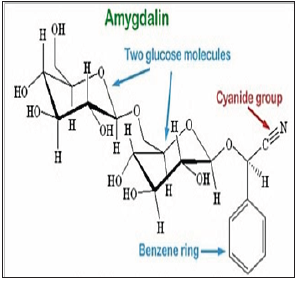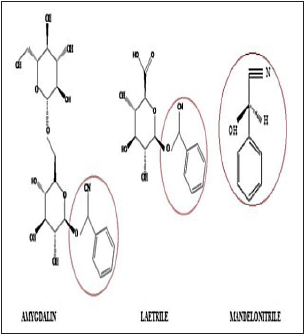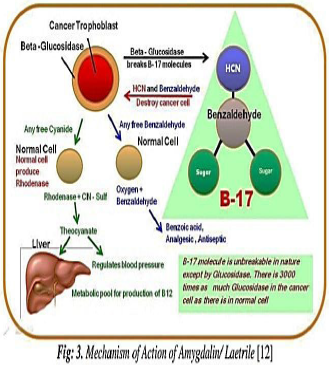- Submissions

Full Text
COJ Technical & Scientific Research
Antioxidant Activity and Defensive Role of Vitamin B-17 to Fight Cancer
Amany MB, Moustafa AAA* and Manar HA
Agricultural Biochemistry Department, Faculty of Agriculture
*Corresponding author: Moustafa AAA, Faculty of Agriculture, Beni-Suef, Egypt
Submission: June 16, 2020; Published: September 08, 2020

Volume3 Issue2September, 2020
Abstract
Amygdalin is also called Vitamin B17 and its semi synthetic product is laetrile, is a glycoside nutrient associated with cancer prevention in substitute medicine practices and there are some claims that Amygdalin actually cured cancer. Vitamin B17 is derivative of natural food sources and most rich in seeds of apricots and apples. Amygdalin interacts with other antioxidants like vitamin A along with enzymes found in the pancreatic juice to break down and eliminate injurious cells from the body. This beneficial compound is released into the body’s tissues and targets and destroys mutated cells. Although more formal research is still needed to prove vitamin B17’s effectiveness, many alternative medicine practitioners use vitamin B17 to increase immunity. Cyanide is thought to be the main anti-cancer component of vitamin B17 but is not fully proven in clinical settings as of today.This makes it useful for support, immunity and potentially even various forms of disease prevention. Vitamin B17 scientifically named mandelonitrile β-D-gentiobioside, is consider a nitriloside (a natural cyanide-containing substance). Laetrile (semi synthetic) is synthesized by hydrolysis reaction of amygdalin and extract out in the form of vitamin B17, is most well-known for potentially helping prevent cancer development through the production of hydrogen cyanide and is released into the body’s tissues and targets and destroys mutated cells. Still more clinical studies are needed which prove that amygdalin is effective to cure cancer. Amygdalin have Cyanide is thought to be the main anti-cancer component of vitamin B17 but is not fully proven in clinical studies as of today that it is a myth or truth.
Keywords: Amygdalin; Cancer; Apricots; Peaches; Laetrile;Hydrogen cyanide
Introduction
Vitamin B17 is a glycoside nutrient which derived from natural food [1] which is found in abundant quantities in members of Rosacea family including almonds, apricots, apples, peaches etc. [2]. Is a cyanogenic glycoside can be derived from the aromatic amino acid phenylalanine [3], Vitamin B17 scientifically named mandelonitrile beta-D-gentiobioside, is consider a nitriloside (a natural cyanide-containing substance). Laetrile (semi synthetic) is synthesized by hydrolysis reaction of amygdalin and extract out in the form of vitamin B17 (Figure 1) [4].
Figure 1: Chemical structure of amygdalin (Vitamin B17).

Sources
Amygdalin is contained in kernels, of fruits such as apricot (8%),
peach (6%), bitter almond (5%), and plum (2.5%); amygdalin is also
found in the seeds of the apple [5] lima beans, clover and sorghum
[6]. Difference between Amygdalin, Laetrile and D- Mandelonitrile
- Β Glucuronoside Amygdalin (C20H27NO11) is several times puzzled
with laevorotatory mandelonitrile, which is generally identified as
Laetrile (C14H15NO7) [7]. It is commonly assumed that amygdalin is
a substance that is derived from plants and laetrile is the purified
form of amygdalin However, laetrile and amygdalin have dissimilar
[8]. In 1950s, amygdalin was formulated in injectable form and
patented as laetrile (laevorotatory mandelonitrile) for treatment
of cancer by Krebs and sons, which created the confusion about
amygdalin and laetrile amygdalin, laetrile and d-mandelonitrile-
β-glucuronoside. This confusion about names is still present [9].
Mandelonitrile is a basic constituent of both substances and it
consists of cyanide group.
Similarly, in 1950s, amygdalin was designated as “Vitamin
B-17”, but this is not a vitamin (Figure 2). The breakdown of
amygdalin is catalyzed by the action of β-D-glucosidase [10].
Figure 2: Differences in chemical structure between Amygdalin, Laetrile and Mandelonitrile.

Therapeutic effects of amygdalin
Amygdalin is a traditional drug whose anti-inflammatory, antipyretic, antitussive and thirst-quenching effects and other therapeutic benefits are known for many years [11]. A recent study showed that amygdalin treatment was useful for alcoholinduced gastric ulceration and protection of gastric mucosa might be mediated by TNF-α suppression and gastric mucosal nitric oxide production [12]. It is also used for treating and preventing migraine, hypertension and other inflammatory disorders [13]. It is stated that amygdalin can inhibit angiogenesis in a similar method to other cyano-group carrying compounds e.g., coumarone [14]. A study was conducted to investigate antigenic efficacy of amygdalin on cultured endothelial cells of diabetic rats. Amygdalin induced inhibitory effects on angiogenesis in diabetic rats [15]. Angiogenesis is a vital hallmark of cancer cells [16]. The anti a gynogenic activity of amygdalin investigated in the study may contribute to suppression of growth of cancer cells [15].
Potential benefits of laetrile
Some research studies found that amygdalin or (Vitamin B17) the natural form of laetrile, may have other health benefits. Benefits of amygdalin for Health: It may lower blood pressure: In one study, amygdalin lowers systolic blood pressure by 28.5% and diastolic blood pressure by 25%. These effects will be improved when taken with vitamin [17]. It may relieve pain: Animal clinical studies prove that amygdalin help relieve pain caused by inflammatory conditions, such as joint pains, arthritis. But human clinical studies are still awaited [18]. It may boost immunity: A test-tube study found that amygdalin improved the ability of immune cells to fight with cancer cells [19].
History of Amygdalin
In 1830s, French chemists Robiquet and Boutron-Charlard isolated amygdalin from bitter almonds. Later, Liebig and Wohler observed that amygdalin was hydrolyzed with the evolution of Benz aldehyde and hydrogen cyanide by an enzyme preparation from bitter almonds which was subsequently named as emulsion [20]. Amygdalin was used as an antineoplastic agent for the first time in 1845 in Russia [21]. In the 1920s, Dr. Ernst Krebs observed that apricot kernels extract minimized tumors of rodents while he was working on techniques to discover a method for enhancing the taste of bootleg whiskey [22]. Initial reports on the administration of amygdalin dates back to 1920s in the United States (US) [23]. However, at that time oral formulation was determined to be too toxic so disused [24]. In 1970s, one of the most widespread, nonconventional antineoplastic therapies was amygdalin and by 1978, almost 70,000 US cancer patients used it [25]. A ban was then put on transport of amygdalin in US. But, for cancer patients at death’s door, amygdalin use was permissible in 23 states of USA [24]. Due to controversies about amygdalin therapy, National Cancer Institute (NCI) planned to analyze its efficiency. NCI sponsored a clinical trial, with the consent of FDA and it was unsuccessful in proving anti-cancer efficacy of amygdalin [25]. By that time, FDA banned amygdalin and it was illegal for sale as pharmaceutical product. Instead of this worldwide restriction, it is still formulated and used as an anti-cancer agent [21].
Anti-Cancer Effects
Some researches is assumed that vitamin B17 is helpful in prevent spreading cancer cells and keeping it at minimum levels, avoiding cancer and keeping the spread of existing cancer cells to a minimum, on the other hand, others show no effects of vitamin B17 on cancer cells. Vitamin B17 has the ability to kill cancer cells through release cyanide more than killing normal, healthy cells [26].
How Vitamin B17 Kills Cancer?
According to research conducted by Ernest T. Krebs Jr. the mechanism of action is following: our body has one particular enzyme called Rhodanese found everywhere in the body except at the cancer cells, and the enzyme Beta-Glucosidase found in very large quantities only at the cancer cell but not found anywhere else in the body. If there is no cancer in the body, there is no enzyme Beta-Glucosidase [27]. Vitamin B17 is made up of 2 parts glucose, 1-part Hydrogen Cyanide and 1-part Benzaldehyde (analgesic/ painkiller). When B17 is introduced to the body, it is broken down by the enzyme Rhodanese. The Rhodanese breaks the Hydrogen Cyanide and Benzaldehyde down into 2 by-products, Thiocyanate and Benzoic acid which are beneficial in nourishing healthy cells and forms the metabolic pool production for vitamin B12. When the B17 comes into contact with cancer cells, there is no Rhodanese to break it down and neutralize it but instead, only the enzyme Beta-Gucosidase is present in very large quantities. When B17 and Beta-Glucosidase come into contact with each other, a chemical reaction occurs, and the Hydrogen Cyanide and Benzaldehyde combine synergistically to produce a poison which destroys and kills the cancer cells (Figure 3) [28]. This whole process is known as selective toxicity. Only the cancer cells are specifically targeted and destroyed [29]. Zinc is the transportation mechanism for laetrile in the body. Biochemists and researchers have found that patient did not have sufficient level of zinc; the laetrile would get into the tissues of the body. They also found that magnesium, selenium, vitamin A, B and vitamin C all played an important part in maintaining the body’s defense mechanism [30]. The cancer is best treated with a total nutritional program consisting of diet, vitamins, minerals, laetrile and pancreatic enzymes. Pancreatic enzymes form the first layer of defense the body has against cancer [27].
Figure 3: Mechanism of action of Amygdalin/Laetrile.

References
- Mora A, Jonas G, Adler C, Hund A, Anders H et al. (2016) Application of the prunus spp. cyanide seed defense system onto wheat: reduced insect feeding and field growth tests. J Agric Food Chem 64(18): 3501-3507.
- Ioannis P, Anastasis S, Andreas Y (2015) Tripterygium wilfordii extract (Triptolide) and amygdalin promotes cell death in cancer cells: true or a myth. Am J Can Prevent 3(4): 77-83.
- Lerner I (1981) Laetrile: A lesson in cancer quackery. CA Cancer J Clin 31(2): 91-95.
- Satbir S, Reshu V, Tarun V (2018) Vitamin-B 17: An alternative treatment of cancer a myth or truth. Journal of Molecular Pharmaceuticals and Regulatory Affairs 1(1): 1-5.
- Nitin S (2016) Vitamin B17 and its proposed application in treating cancer. Interdisciplinary Journal of Contemporary Research 3(6): 2393-8358.
- Bolarinwa F, Orfila C, Morgan R (2014) Amygdalin content of seeds, kernels and food products commercially available in the UK. Food Chem 152: 133-139.
- Perez J (2013) Amygdalin analogs for the treatment of psoriasis. Future Med Chem 5(7): 799-808.
- Dorr R, Paxinos J (2013) The current status of laetrile. Ann Intern Med 89(3): 389-397.
- Fenselau C (1977) Mandelonitrile beta-glucuronide: Synthesis and characterization. Science 198(4317): 625-627.
- Halenár M, Medvedova M, Maruniakova N, Kolesarova A (2015) Ovarian hormone production affected by amygdalin addition in vitro. J Microbiol Biotechn Food Sci 4(2): 1-19.
- Chang HK, Yang HY, Lee TH, Shin MC, Lee MH, et al. (2005) Armeniacae semen extract suppresses lipopolysaccharide-induced expressions of cycloosygenase-2 and inducible nitric oxide synthase in mouse BV2 microglial cells. Biol Pharm Bull 28(3): 449- 454.
- Nabavizadeh F (2011) Gastroprotective effects of amygdalin on experimental gastric ulcer: Role of NO and TNF-α. J Med Plants Res 5(14): 3122-3127.
- Yan J (2006) Preparative isolation and purification of amygdalin from prunus armeniaca L. with high recovery by high‐speed countercurrent chromatography. J Liq Chrom Rel Tech 29(9): 1271-1279.
- Lee S, Sivakumar K, Shin WS, Xie F, Wang Q (2006) Synthesis and anti-angiogenesis activity of coumarin derivatives. Bioorganic & Medicinal Chemistry Letters 16(17): 4596-4599.
- Marianpour H, Shahnaz K, Ali Z, Omid K, Siavash GN, et al. (2012) Amygdalin inhibits angiogenesis in the cultured endothelial cells of diabetic rats. Indian J Pathol Microbiol 55(2): 211-214.
- Eichholz A, Merchant S, Gaya A (2010) Anti-angiogenesis therapies: Their potential in cancer management. Onco Targets Ther 3: 69-82.
- Milazo S, Horbener M (2015) Laetrile treatment for cancer. Cochrane Database Syst Rev (4): 54-76.
- Suchard JR, Wallace KL, Gerkin R (1998) Acute cyanide toxicity caused by apricot kernel ingestion. Ann Emerg Med 32(6): 742-744.
- Liczbinski P, Bukoswka B (2018) Molecular mechanism of amygdalin action in vitro review of latest research. Immunopharmacol Immunotoxicol 40(3): 212-218.
- Greenberg DM (1975) The vitamin fraud in cancer quackery. West J Med 122(4): 345-348.
- Blaheta RA, Karen N, Axel H, Eva J (2016) Amygdalin, quackery or cure? Phytomedicine 23(4): 367-376.
- Lerner IJ (1990) Laetrile: A lesson in cancer quackery. CA Cancer J Clin 31(2): 91-95.
- Moss RW (2005) Patient perspectives: Tijuana cancer clinics in the post-NAFTA era. Integr Cancer Ther 4(1): 65-86.
- Davignon JP, Trissel LA, Kleinman LM (1978) Pharmaceutical assessment of amygdalin (Laetrile) products. Cancer Treat Rep 62(1): 99-104.
- Curran WJ (1980) Laetrile for the terminally ill: Supreme court stops the nonsense. N Engl J Med 302(11): 619-621.
- Wahab F, Zachary SB, Daniel WA, Rick S, Alain B (2008) Problems and pitfalls in the analysis of amygdalin and its epimer. J Agric Food Chem 63(40): 8966-8973.
- George M (2016) Practical Organic Chemistry (4th edn), London, UK, pp. 509-517.
- Barrie RC (2009) Amygdalin (Vitamin B17). IOOJ 23(5): 1-2.
- Walaa FE (2018) Mechanism action of amygdalin as natural chemotherapy to prevent colon cancer. RRJPTS 6(1): 47-51.
- Moertel CG, Fleming TR, Rubin J, Kvols LK, Sarana G, et al. (1982) A clinical trial of amygdalin (Laetrile) in the treatment of human cancer. N Engl J Med 306(4): 201-206.
© 2020 Moustafa AAA. This is an open access article distributed under the terms of the Creative Commons Attribution License , which permits unrestricted use, distribution, and build upon your work non-commercially.
 a Creative Commons Attribution 4.0 International License. Based on a work at www.crimsonpublishers.com.
Best viewed in
a Creative Commons Attribution 4.0 International License. Based on a work at www.crimsonpublishers.com.
Best viewed in 







.jpg)






























 Editorial Board Registrations
Editorial Board Registrations Submit your Article
Submit your Article Refer a Friend
Refer a Friend Advertise With Us
Advertise With Us
.jpg)






.jpg)














.bmp)
.jpg)
.png)
.jpg)










.jpg)






.png)

.png)



.png)






